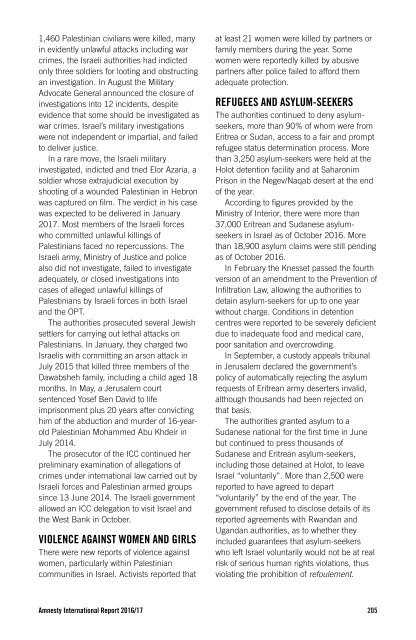AMNESTY INTERNATIONAL REPORT 2016/17
2lEHU9j
2lEHU9j
Create successful ePaper yourself
Turn your PDF publications into a flip-book with our unique Google optimized e-Paper software.
1,460 Palestinian civilians were killed, many<br />
in evidently unlawful attacks including war<br />
crimes, the Israeli authorities had indicted<br />
only three soldiers for looting and obstructing<br />
an investigation. In August the Military<br />
Advocate General announced the closure of<br />
investigations into 12 incidents, despite<br />
evidence that some should be investigated as<br />
war crimes. Israel’s military investigations<br />
were not independent or impartial, and failed<br />
to deliver justice.<br />
In a rare move, the Israeli military<br />
investigated, indicted and tried Elor Azaria, a<br />
soldier whose extrajudicial execution by<br />
shooting of a wounded Palestinian in Hebron<br />
was captured on film. The verdict in his case<br />
was expected to be delivered in January<br />
20<strong>17</strong>. Most members of the Israeli forces<br />
who committed unlawful killings of<br />
Palestinians faced no repercussions. The<br />
Israeli army, Ministry of Justice and police<br />
also did not investigate, failed to investigate<br />
adequately, or closed investigations into<br />
cases of alleged unlawful killings of<br />
Palestinians by Israeli forces in both Israel<br />
and the OPT.<br />
The authorities prosecuted several Jewish<br />
settlers for carrying out lethal attacks on<br />
Palestinians. In January, they charged two<br />
Israelis with committing an arson attack in<br />
July 2015 that killed three members of the<br />
Dawabsheh family, including a child aged 18<br />
months. In May, a Jerusalem court<br />
sentenced Yosef Ben David to life<br />
imprisonment plus 20 years after convicting<br />
him of the abduction and murder of 16-yearold<br />
Palestinian Mohammed Abu Khdeir in<br />
July 2014.<br />
The prosecutor of the ICC continued her<br />
preliminary examination of allegations of<br />
crimes under international law carried out by<br />
Israeli forces and Palestinian armed groups<br />
since 13 June 2014. The Israeli government<br />
allowed an ICC delegation to visit Israel and<br />
the West Bank in October.<br />
VIOLENCE AGAINST WOMEN AND GIRLS<br />
There were new reports of violence against<br />
women, particularly within Palestinian<br />
communities in Israel. Activists reported that<br />
at least 21 women were killed by partners or<br />
family members during the year. Some<br />
women were reportedly killed by abusive<br />
partners after police failed to afford them<br />
adequate protection.<br />
REFUGEES AND ASYLUM-SEEKERS<br />
The authorities continued to deny asylumseekers,<br />
more than 90% of whom were from<br />
Eritrea or Sudan, access to a fair and prompt<br />
refugee status determination process. More<br />
than 3,250 asylum-seekers were held at the<br />
Holot detention facility and at Saharonim<br />
Prison in the Negev/Naqab desert at the end<br />
of the year.<br />
According to figures provided by the<br />
Ministry of Interior, there were more than<br />
37,000 Eritrean and Sudanese asylumseekers<br />
in Israel as of October <strong>2016</strong>. More<br />
than 18,900 asylum claims were still pending<br />
as of October <strong>2016</strong>.<br />
In February the Knesset passed the fourth<br />
version of an amendment to the Prevention of<br />
Infiltration Law, allowing the authorities to<br />
detain asylum-seekers for up to one year<br />
without charge. Conditions in detention<br />
centres were reported to be severely deficient<br />
due to inadequate food and medical care,<br />
poor sanitation and overcrowding.<br />
In September, a custody appeals tribunal<br />
in Jerusalem declared the government’s<br />
policy of automatically rejecting the asylum<br />
requests of Eritrean army deserters invalid,<br />
although thousands had been rejected on<br />
that basis.<br />
The authorities granted asylum to a<br />
Sudanese national for the first time in June<br />
but continued to press thousands of<br />
Sudanese and Eritrean asylum-seekers,<br />
including those detained at Holot, to leave<br />
Israel “voluntarily”. More than 2,500 were<br />
reported to have agreed to depart<br />
“voluntarily” by the end of the year. The<br />
government refused to disclose details of its<br />
reported agreements with Rwandan and<br />
Ugandan authorities, as to whether they<br />
included guarantees that asylum-seekers<br />
who left Israel voluntarily would not be at real<br />
risk of serious human rights violations, thus<br />
violating the prohibition of refoulement.<br />
Amnesty International Report <strong>2016</strong>/<strong>17</strong> 205


